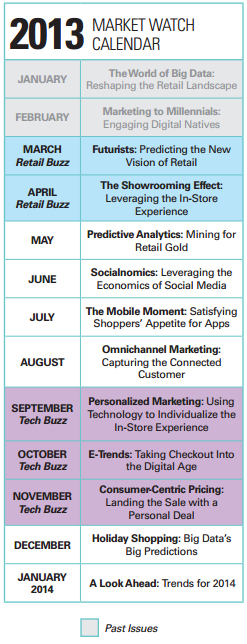Imagine billboards that change based on your emotions and automatic food deliveries tailored to your health needs as defined by your genetic profile—it may sound like a tale stolen from a science fiction novel, but it is in fact part of the future vision of retail predicted by well-respected experts in the field. Employed by leading retailers and CPGs including Walmart, Nestle, HJ Heinz and the Kellogg Company, futurists help determine which trends are likely to be passing fads and which embody the staying power to change the face of business—and even the world. Using the visions presented by futurists to inform and guide decision making and long-term strategies can mean the difference between thriving in the future of retail and going the way of New Coke.
-Thomas Frey, FuturistSpeaker.com
Contrary to many people’s first impressions, futurists don’t truly tell the future. Instead, they assess different scenarios in the context of present conditions and historical influences to forecast situations, technologies and events that could develop in the future. They do not serve up a single vision of the future, but rather help organizations see the various scenarios that are possible, probable and preferable in the coming years and even decades. These scenarios can help retailers and CPGs prepare for change, innovate and seek new opportunities, and make better decisions today.
So what do these visionaries conceive for the future of retail? Though details vary, a few basic themes are pervasive.
Are brick-and-mortar stores soon to join the ranks of soda fountains and five-and-dimes in the quaint history of retail? Not likely, according to most futurists. Despite the increasing popularity of online shopping, many futurists believe physical stores will still have an important role to play in the future of retail. The details of that role, however, will undergo significant change. Thanks in large part to the growing influence of Millennials, stores will become more about the experience and the social aspects of shopping than the product.
“Gone are the days where stores could simply warehouse products for consumers to buy… Retail 2.0 will form around phrases like ‘experiential entertainment,’ ‘active engagement,’ and ‘interaction with experts,’” writes Thomas Frey, Innovations Editor for The Futurist magazine and Senior Futurist at the DaVinci Institute, on his website FuturistSpeaker.com.
For example, stores may provide in-house experts to advise customers on the best products to buy for their particular needs. Or, they may transition to non-inventory demonstration locations, where shoppers can see, taste, smell, touch and even help customize a product, which would then be ordered instead of taken straight home.
Technology Drives Personalization
Today it’s the norm for ads to pop up on websites touting a new deal on that blender you just abandoned in your online shopping cart or suggesting you buy the matching purse to the shoes you recently purchased. But what about a billboard that can tell when you last shaved and instantly display a message to “get rid of that 3-day shadow”? Or a TV that scans your face to determine what makeup you’re wearing, then displays an advertisement for an improved formulation? That’s the type of personalized advertising futurists envision in tomorrow’s marketplace, as facial recognition software is already being built into advertising platforms and programmed with the ability to change the advertising messages based on a shopper’s gender, age, facial expressions and more.
With continued improvement and widespread adoption of this recognition software, advertising platforms could potentially even pinpoint individual identities, reports Forbes. Once identified, the software could then link to even more databases detailing personal shopping history, social media presence and other elements of Big Data to tailor the message even further. For example, a makeup billboard could take a photo of a passerby and link it to a woman’s driver’s license via an online insurance database. Identified as Ann Smith of Chicago, IL, the software could pull up shopper loyalty card data showing that Ann buys organic apples and wrinkle cream, and search the web to find that Ann’s Facebook wall includes many pictures of three young children. The billboard could then instantly change to show an all-natural, all-in-one foundation designed to improve signs of aging and reduce prep time for busy mothers.
Intelligence and Insights Take to the Cloud
Today, the “Cloud”—a network of computer software, hardware and services accessible anywhere, at anytime via the Internet (as opposed to being housed on-site in a single location)—is mainly used for data storage and remains largely invisible to the average consumer. Futurists predict, however, that it will become a regular resource in our daily lives—providing analysis and advice based on insights gleaned from data collected from shopping and browsing history, mobile devices, electronic medical records and numerous other sources about our activities, habits and even genetics.
For example, in The Futurist, futurists Chris Carbone and Kristin Nauth predict that “virtual agents” will move from the type of automated phone-based customer service we’re currently used to, to a personalized form of support that provides information and performs useful tasks. These agents might, for example, create weekly menus based on a family’s health profile, fitness goals and eating preferences, and automatically order the ingredients needed to create those meals. Retailers and CPGs that partner with virtual agent providers could be primed to capture market share, without ever even marketing to the end-consumer.
It is an undeniable fact that the retail market faces huge changes in the coming decades. As Dr. Peter Bishop, Director of Future Studies at the University of Houston said in a recent interview with Business Insider, “there will be significant change… within our lifetime for sure…. It will be new enough that we will be uncomfortable, we will be unprepared, and that we will have to learn new skills and new techniques in order to be successful in that future compared to how we are being successful today.” The time to start preparing is now.


